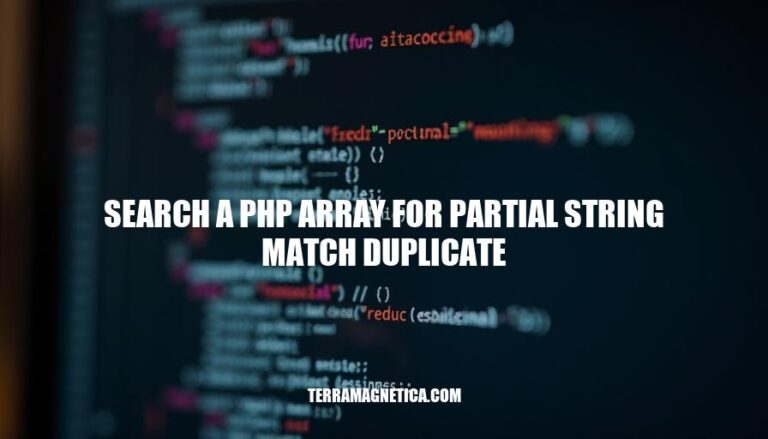


In PHP programming, searching an array for partial string matches is a frequent task. This involves checking if any elements in an array contain a specific substring. It’s crucial for data processing because it helps in filtering and identifying relevant data efficiently, ensuring accurate and meaningful results in applications like search engines, data validation, and content management systems.
To use the array_filter function in PHP to search an array for partial string matches, you can use a callback function with strpos. Here’s a concise example:
<?php
$array = ['apple', 'banana', 'grape', 'pineapple', 'apricot'];
$search = 'ap';
$result = array_filter($array, function($item) use ($search) {
return strpos($item, $search) !== false;
});
print_r($result);
?>
This code will filter the array to include only elements containing the substring ‘ap’.
To use the preg_grep function to search a PHP array for partial string matches, you can follow this approach:
<?php
$array = ["apple", "banana", "grape", "pineapple", "apricot"];
$pattern = "/app/"; // Pattern to search for partial match
$result = preg_grep($pattern, $array);
print_r($result);
?>
This code will return an array containing elements that match the pattern “app” (i.e., “apple” and “pineapple”).
array_filter and strpos for Partial MatchesTo identify duplicates based on partial string matches, you can use array_filter combined with strpos to search for substrings.
$array = ["apple", "banana", "apricot", "apple pie", "banana split"];
$search = "apple";
$matches = array_filter($array, function($item) use ($search) {
return strpos($item, $search) !== false;
});
print_r($matches);
array_uniqueOnce you have identified the matches, you can use array_unique to remove duplicates.
$uniqueMatches = array_unique($matches);
print_r($uniqueMatches);
You can create a custom function to handle both identifying partial matches and removing duplicates.
function findUniquePartialMatches($array, $search) {
$matches = array_filter($array, function($item) use ($search) {
return strpos($item, $search) !== false;
});
return array_unique($matches);
}
$array = ["apple", "banana", "apricot", "apple pie", "banana split"];
$search = "apple";
$result = findUniquePartialMatches($array, $search);
print_r($result);
For multidimensional arrays, you can use a similar approach but ensure you handle the specific key you are interested in.
function uniqueMultidimArray($array, $key) {
$tempArray = [];
$keyArray = [];
foreach ($array as $val) {
if (!in_array($val[$key], $keyArray)) {
$keyArray[] = $val[$key];
$tempArray[] = $val;
}
}
return $tempArray;
}
$array = [
["id" => 1, "name" => "apple pie"],
["id" => 2, "name" => "banana split"],
["id" => 3, "name" => "apple tart"],
["id" => 1, "name" => "apple pie"]
];
$result = uniqueMultidimArray($array, 'id');
print_r($result);
These strategies and code examples should help you effectively identify and handle duplicates in PHP arrays based on partial string matches.
Performance Implications:
array_filter:
preg_grep:
Conclusion: For large arrays and complex patterns, preg_grep is more efficient. For smaller arrays or when custom logic is required, array_filter is preferable.
You can use various strategies such as array_filter, preg_grep, or custom loops with conditional statements.
When using array_filter, consider the performance implications and potential overhead of repeatedly calling the callback function. For larger arrays and complex patterns, preg_grep is generally more efficient due to its optimized regex engine. Custom loops can be useful for simple cases or when specific logic is required.
Further reading resources may include PHP documentation on array_filter, preg_grep, and other relevant functions. Additionally, exploring PHP frameworks or libraries that provide optimized array manipulation tools can be beneficial for complex tasks.